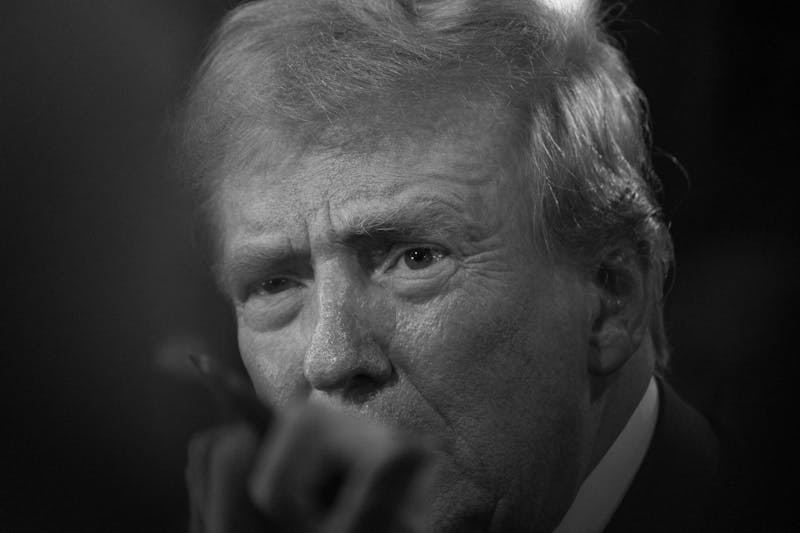We all know the news coverage about the Katrina disaster has been, well ... questionable. We've got looting vs. finding, federal vs. local responsibility, and the really big question: does George W. Bush really not care about black people?
In the midst of this uncertainty, I am sure about one thing. I am astounded by the fact that we the privileged, and by privileged I mean anyone who managed to get out of the storm area before it hit or anyone who happens to live somewhere else, have the audacity to admonish the actions of those people who have lost all the things we continue to take for granted each day.
From the mouth of our president: "I think there ought to be a zero tolerance of people breaking the law during an emergency such as this." Seems like a reasonable statement -- we all know people shouldn't break the law -- but what the president fails to realize is that "the law" has already been broken. When Katrina reared her ugly head, the Gulf Coast was reduced to a Hobbesian "state of nature" where "the condition of man is a condition of war."
This explanation is an extreme, but it is useful to explain the crime and violence that often result from a suspension of the norm. Chaos breeds violence. We can pretend that "good" people don't commit thievery because they are "good," or we can recognize that the human is mainly a product of his or her environment and in our natural state we are inherently selfish. Government is meant to protect us from existing in such a state. When government failed to protect the people who were affected by Katrina, all bets were off, the deal was broken.
Do you know anyone who would starve or die of thirst before taking something that wasn't originally theirs? Even the most demure characters will do what they must to survive by any means necessary. If Hurricane Katrina had struck Greenwich, Conn., and washed away all the beautiful mansions without warning, we would have observed a similar scene in a different color. Cable knit sweaters would be flying as normally Stepford-esque women broke into raging fistfights over the last two bottles of Perrier.
Just last week, I learned how quickly a situation can get ugly. Instead of paying $60 for Amtrak from Washington, I decided to opt for the Greyhound Bus at a much more reasonable $25. It was scheduled to leave at 9 a.m., and at 9:20, there was still no word on when the bus would board.
My patience subsided and I felt my blood begin to boil. Mutterings between people standing near one another turned into shouts. "What's going on here!" "I gotta connection to make!" "I paid good money for this ticket!" I took it upon myself to be the voice of the people. I marched up to a Greyhound employee and demanded an answer. When the woman regarded me with indifference, I honestly felt as if I might pounce. I imagined the angry crowd standing around as I beat the Greyhound employee to a pulp for taking advantage of my people. I then understood the type of desperation that can take over when we lose all semblance of control in a situation.
This isn't to say violence is ever the answer. Of course a plasma TV is not going to provide sustenance for a hungry family. But just think about what you would do if you had nothing left. If George W. Bush is going to implement a zero-tolerance policy, it should be one against the type of glaring poverty in the midst of extravagant wealth that led to the horror we witnessed in the aftermath of Katrina.
As for the race issue? Primarily, we must all recognize that it is an issue. Let's get rid of this colorblindness fantasy. While I don't think the White House made a conscious decision to not help, or that George Bush doesn't care about black people a la Kanye West, I do believe what we are experiencing is a tangible representation of the subconscious, institutionalized racism that plagues our country.
It's not going away on its own. The only way we will make progress is if we acknowledge the existence of racism and the disenfranchisement of the poor. Sadly, we've got a long way to go when it comes to admitting when we're wrong.
On Tuesday the president offered the following "part-apology." "Katrina exposed serious problems in our response capability at all levels of government, and to the extent that the federal government didn't fully do its job right, I take responsibility." Well to the extent that it matters, Mr. President, I do not accept that apology. The more than 600 people who lost their lives, and the countless others who lost their livelihood, deserve more.Titilola Bakare is a senior English major from Harrisburg, Pa. Notes from the Underground appears on Thursdays.
The Daily Pennsylvanian is an independent, student-run newspaper. Please consider making a donation to support the coverage that shapes the University. Your generosity ensures a future of strong journalism at Penn.
DonatePlease note All comments are eligible for publication in The Daily Pennsylvanian.







